
You are a merchant in the city of Genoa. The game board features a district of the city bordered by darker tiles. You will attempt to acquire wealth and fame in the various buildings identified with a banner.
These buildings allow you to take the various actions that will lead you to prosperity. However, since you can only take one action per turn, you will need to be a canny salesman and sell the other actions in order to generate a profit.
Cunning strategies and smart negotiations should, in the end, earn you enough to rise above the competition!
Components

- 1 Trade tower
- 1 round marker
- 2 8-sided dice
- 40 Commodity tiles
- 35 wooden Ownership markers
- 27 special tiles
- 60 cards
- 80 coinsns)
- 1 game board
- 1 first player marker
- 5 player tiles
- Instructions
Setup
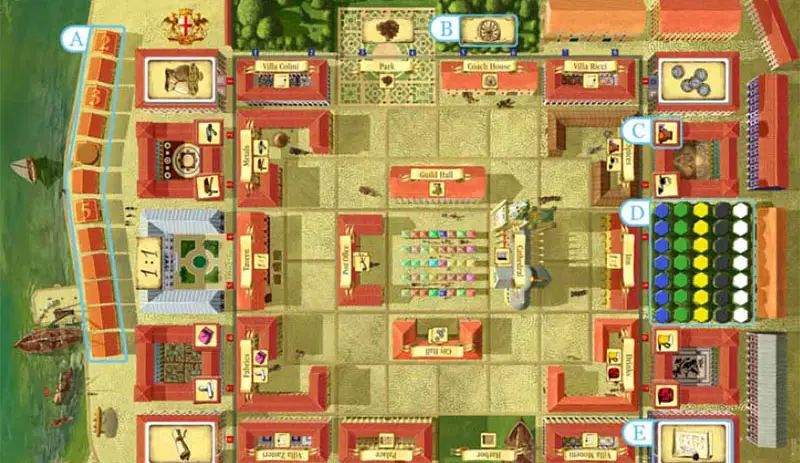
Place the following pieces according to the illustration:
A The round marker is placed on the space corresponding to the number of players. On space 4 in a 4-player game for instance.
B The 5 kinds of special tile (5 each, 7 Trade 1:1) are put on the appropriate spaces.
C The 8 kinds of Commodity tile (5 each) are put on the appropriate spaces.
D The player chooses a color and puts the corresponding player tile in front of himself and also places his 7 markers on the board as shown. Unused markers and player tiles are put back in the box.
E First, separate the 60 cards according to their back. They are then shuffled and constitute four facedown piles.
Each Player Receives:
One card from each of the four piles. These cards, which are kept hidden, make up the player's starting hand.
130 ducats (2x5-ducat coins, 2x10 and 2x50). The remaining coins are separated according to their value and placed beside the game board as the bank.
During the game, players should keep their coins hidden either by keeping them in their hands or by stacking them in front of themselves.
The last person who visited a market is the first player. He takes:
- the Trade tower (the 5 discs),
- the two dice,
- the first player marker that he keeps in front of himself until the end of the game.
Note: The first player is the same throughout the game.
Object of the Game
Be the wealthiest player at the end of the last round.
Game Play
A game is played over 6 to 12 rounds, each of which are divided into turns. There are as many turns per round as there are players.

The following happens each turn:
The round starts with the first player becoming the merchant. He receives the 5 discs that make up the Trade tower (sometimes simply referred to as the tower).
The merchant plays his turn (see Game turn) and gives the tower to the next player (clockwise) once his turn is over. This player then becomes the new merchant and so on.
A round ends when every player has been the merchant.
Once the last player has played his turn, he moves the round marker down one space on the round track. Unless the marker was already on the last space of the track, the game continues.
If it was on the last space of the track, the game is over and the players count their ducats to determine the winner.
Note: For the remainder of these rules, the active player will be referred to as the merchant.
Each turn is divided into 4 phases:
- Determine the starting space
- Movement / Actions / Negotiations
- Acquire buildings
- End of turn
1. Determine the Starting Space
The merchant rolls the dice to determine the starting space: the blue die gives the horizontal coordinate (blue number) and the red die, the vertical coordinate (red number).
The five discs that constitute the Trade tower are put on the space where these two coordinates meet. This is the tower's starting space.
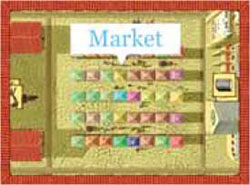
Important : If the Market is obtained with the dice roll at the beginning of the round (the four squares that constitute the Market are: 4-4, 4-5, 5-5, 5-4), the round marker is moved down one space on the track.
This reduces the total number of rounds played.
Example: The merchant rolls the dice and gets the following result: 3 on the blue die and 2 on the red die. The five discs of the Trade tower are put on the street space indicated by the arrows.

2. Movement / Actions / Negotiations
Movement
Beginning with the starting space, the merchant can move the tower from one space to the next. The tower is moved orthogonally (never diagonally) from one space to an adjacent one. The merchant must leave a disc behind on each space that the tower visits.
As such, the tower can move up to four spaces each turn. Counting the starting space, the tower can visit a total of 5 spaces per turn.
The following rules must be followed when moving the Trade tower:
Every building and street space counts as a single space. The Market is also considered to be a single space.
For the purpose of this game, the Park and the Harbor are buildings.
A space may never be visited twice in the same turn.
The merchant may keep on moving the tower even if every other player has already taken an action (see Actions below).
The merchant may, at any moment, decide to stop moving the tower. He can even leave it on the starting space.
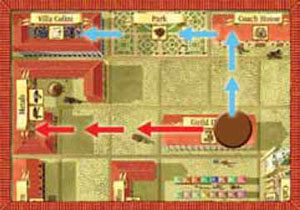
Example: The merchant starts on the street space adjacent to the Guild Hall. From this space, the tower can move in numerous ways.
Movement A shows the merchant moving the maximum number of spaces (4) to reach Villa Collini. On the other hand, Movement B only uses 3 movements to reach Metals.
Actions
Each visited building allows one player to take one action. Since the merchant can only perform one action, the other players can use the other actions. Each building has a different action associated to it.
Including the starting space, the tower can visit a total of 5 buildings in one turn.
The following rules regarding actions apply:

Actions are only possible in the 18 buildings identified with a banner. The icons indicate the type of action that is possible.
Each player can only take one action per turn. It is also possible to abstain from doing an action during one turn.
Only one player can use the action of a given building each turn.
The actions are taken immediately when the tower reaches a building; not in the player order.
Negotiations
Before the merchant moves the tower, the other players can offer him various goods in exchange for his moving the tower towards a specific space. As soon as an agreement is reached, the player pays the merchant the agreed upon price.
The merchant then moves the tower towards that space. If it is a building, the player immediately takes the corresponding action.
The following negotiation rules apply:
-
Negotiations always involve the merchant.
-
Offers always imply that the merchant will move the tower onto the agreed upon space and that the offering player will take the action.
-
During the negotiation phase, player may discuss freely and deals may change at any time.
-
The player making an offer must indicate the space he would like the tower to move to and specify what he is willing to pay in return.
Note : A request to have the tower moved onto an empty street space is a valid offer.
-
An offer may include any quantity or combination of goods that are available within the game (commodity, cards, special tiles, Ownership markers or ducats).
Note: When Ownership markers are traded, the offering player puts his marker(s) back in the general supply and the recipient takes the same number of his color.
-
An offer may never include agreements for future actions. However, a player can include in his offer any good that he will obtain by taking the negotiated action. In these cases, the player only gives the goods to the merchant once the action is taken.
-
The merchant is also allowed to include ducats or goods in the offer.
-
The merchant is under no obligation to accept any offer. He can ignore every offer made by the other players and move the tower onto the space(s) of his choice.
As long as the tower can still move, the merchant can negotiate the tower's next move with the other players. This phase ends as soon as the merchant has moved the tower four times or when he decides to stop moving the tower.
Note: The players can choose not to make any offers and hope that the merchant will move the tower on the building they want.
Example: The tower is next to the Coach House and the merchant still has the possiblity of moving the tower one space. Jeff offers 5 ducats to have the tower moved onto this building.
The merchant refuses but says he will agree if a Commodity tile is added to the offer. Jeff accepts and gives the merchant 5 ducats and one Commodity tile.
The tower is then moved onto the Coach House and Jeff immediately benefits from this building's action.
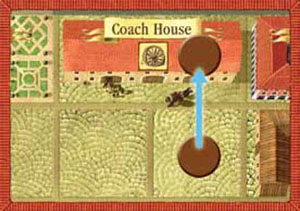
Special Negotiation Cases
A. Non-adjacent space
At any given time, the players can make suggestions to have the merchant move the tower towards a space that it is not yet adjacent to. The merchant can keep these offers in mind but does not have to follow or accept any of them at this time.
Later in the same turn, once the tower is next to a space mentioned in the offer, the merchant can accept the initial offer if the offer still stands. The merchant can also negotiate a new offer with the same or any other player.
He can also move towards the space he wants and stop when he wants, without ever reaching the space mentioned by the other players.
Example: Jeff observes that the tower still has enough discs to reach Villa Colini. Since the tower is not adjacent to Villa Colini, Jeff cannot make a deal with the merchant yet.
He can, however, offer the merchant 15 ducats once the tower moves there. The merchant keeps this proposition in mind and can decide to move accordingly or not.
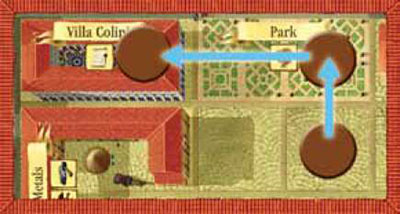
B. Buildings that were not negotiated
When the tower is placed or moved on a building without any deals having been made beforehand (the starting space for instance), the other players may make an offer to the merchant to obtain the action.
If at least one player makes an offer for the building's action, it has to be accepted. However, the merchant can also decide to take the action himself. If he cannot or does not want to use it, he must accept the other player's offer.
If no offers are made, the merchant does not have to take the action himself. It is simply left unused for this turn.
Example: The merchant moves the tower onto the Harbor without having made any deals. Jeff offers the small sum of 5 ducats for the building's action.
No other offers are made. Since the merchant really wants the Villa Monetti action, he has to accept this offer.
If he does not accept the offer, he will have to take the Harbor's action and will no longer be able to take an action this turn.
3. Acquire Buildings
During phase 3, every player can acquire one or two buildings; this is where the tower's discs that were left on the board come into play. Beginning with the merchant and continuing clockwise, each player will have one chance to acquire buildings.
Only the players who currently possess Ownership markers in front of them may participate in this phase. Once everyone has had their chance to acquire buildings, move on to the next phase.
On his turn to acquire one or two buildings, a player must:
-
Have at least one Ownership marker in his personal supply. These markers are gained with the Cathedral's action (see Buildings, cards and tiles).
-
He then chooses a street space occupied by at least one of the tower's discs. If there are no occupied street spaces, it is no longer possible to acquire buildings this turn.
-
After, he may put one or two Ownership markers on buildings orthogonally adjacent to the designated street space. There can be only one marker per building.
Note: It is possible to remove another player's Ownership marker. To do so, a player must sacrifice a marker from his supply.
The two markers (the one already on the building and the one in the removing player's supply) are put back in the general supply.
The player can then, if he wants, become the owner of this building by putting one of his Ownership markers on the building.
-
Finally, he removes the disc from the chosen street space. If there are more than one disc, he removes them all.
Buildings owned increase a player's income during and at the end of the game. During the game, when a player uses a building's action where an Ownership marker is placed, the owner receives 10 ducats from the bank.
The owner never gets these 10 ducats when he takes the action himself.
At the end of the game, a player gains 10 ducats for each of his Ownership markers placed on the buildings.
Example: The merchant is the first player to be able to place one or two Ownership markers. He chooses the street space adjacent to the Guild Hall and the Coach House (a disc can be found there).
The merchant chooses to put one Ownership marker on the Guild Hall and another one on the Coach House; he is now the owner of these two buildings. He must then remove the disc from the chosen street space.
Matt is next. He chooses the last available disc on a street space. Matt removes one marker from his supply in order to remove the Ownership marker on the Coach House. These two markers are put back in the general supply.
Finally, he becomes the owner of the Spices warehouse and the Coach House by putting Ownership markers on both buildings.
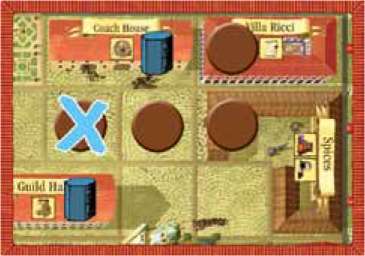
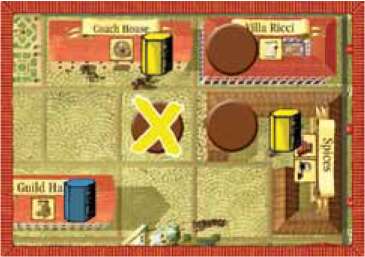
Even though other players have Ownership markers in their personal supply, they are unable to place them on the board since there are no more discs on street spaces.
4. End of Turn
When the last player of a round ends his turn, he moves the round marker down one space on the track. Unless the marker was already on the last space of the track, the game continues.
When the marker leaves the last space of the track, the game is over and the players count their ducats to determine the winner.
Important: The last round of the game is always played completely, even if during a turn a player rolls the Market's coordinates.
In other words, as soon as the round marker is on the last space, the current turn is completed and players then proceed with the final countdown.
Example: The marker was moved at the end of the previous round. Phil is the first player and he begins a new round. He rolls the dice to determine the tower's starting space and he gets a Red 4 and a Blue 4.
He then puts the tower on the Market and moves the round marker down one space; it is now on the last space, meaning it is the last round of the game.
This round will be completed and even if another player obtains the Market's coordinates as a starting space, the round marker will not leave the track. It is the final round.
End of the Game
At the end of the game, each player receives 10 ducats from the bank for every one of his Ownership markers on buildings (not those in the general supply).
The players then reveal their Contract cards and receive the corresponding sum from the bank. The cards, commodities and special tiles a player owns at the end of the game do not yield anything.
Players count their ducats. The wealthiest player wins the game.
In case of a tie, the winner is the tied-player with the most goods (cards, commodities and special tiles).
Rules for 2 Players
The rules are the same except for the following:
Offers made to the merchant must always include at least one good; they cannot be solely monetary.
The merchant gets two actions if the other player takes at least one action.
Note: These rules do not alter in any way the tile "Extra action".
Continue Reading

